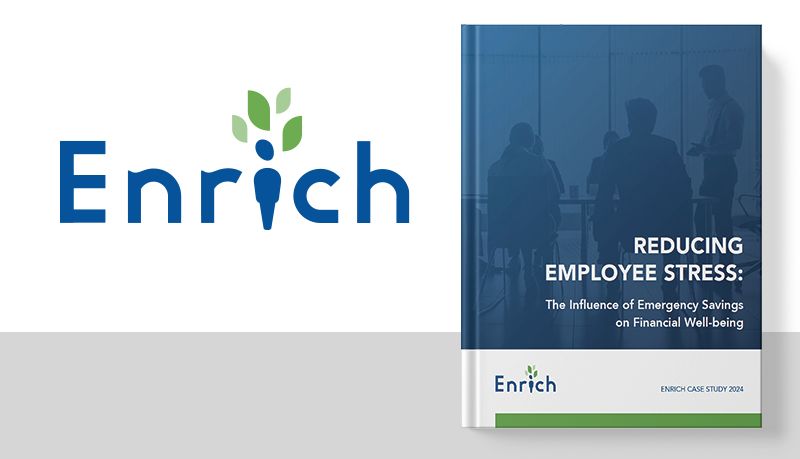Employers and Organizations
Reducing Employee Stress: How Emergency Savings Impacts Employee Financial Wellness [Case Study]
Last Update: February 5, 2024
In today's fast-paced world, financial stress is a common concern affecting many individuals. Our team conducted a comprehensive study to understand the influence of emergency savings on financial well-being and stress levels among our users.
Through the Enrich Financial Wellness Checkup, users were asked crucial questions such as whether they have 3-6 times their monthly expenses saved in an emergency fund. This data allowed us to categorize users based on their emergency savings status and compare average stress scores between groups.
The Connection Between Emergency Savings and Employees' Financial Stress
Our findings revealed a striking correlation between the presence of emergency savings and reduced financial stress.
Users without an emergency fund reported an average stress score nearly 9 points higher than those with savings, highlighting the significant impact of savings on overall stress levels. Further analysis delved into specific demographics and user personality types, revealing nuanced patterns in stress responses based on savings habits.
One key insight from our study is the importance of emergency fund readiness across all personality types and generations.
For example, individuals categorized as cautious or organized exhibited lower stress levels, even without an emergency fund, showcasing the value of prudent financial habits.
On the other hand, those with a fun-seeking or present-focused approach to finances experienced higher stress levels in the absence of savings, emphasizing the need for a balanced approach to financial planning.
Our study also provided valuable generational insights, with younger generations like Gen Z showing a notable decrease in stress with savings. This highlights the evolving nature of financial challenges and attitudes across different ages.
Overall, our research underscores the universal significance of emergency savings in promoting financial security and peace of mind, emphasizing the need for an employee financial wellness program that is tailored to individual needs and preferences.
Why Focus on Employee Financial Wellness?
Focusing on employee financial wellness is crucial for the overall well-being of your workforce. It has been proven that poor financial health can significantly impact an individual's physical and mental health.
By promoting financial wellness, employers can help alleviate some of the financial burdens that employees may face, leading to reduced stress levels and improved job performance.
Providing education and resources on topics such as budgeting, saving for retirement, and building emergency savings can empower employees to take control of their financial well-being and start achieving their financial goals. Encouraging the establishment of emergency savings can help employees feel more financially secure, particularly in times of uncertainty or unexpected financial hardships.
Ultimately, prioritizing employee financial wellness not only benefits the individual but also the organization as a whole by fostering a more engaged and productive workforce.
Investing in the financial wellness of employees is not only the right thing to do but also makes good business sense.
How a Financial Wellness Program for Employees Can Help
A financial wellness program designed to help employees can provide significant benefits for both the employee and the employer. By offering personalized financial wellness programs on a highly customizable platform, employees can access the resources and education they need to improve their overall financial health.
This can lead to increased productivity in the workplace, as employees are better able to focus on their work rather than worrying about their financial situation.
Additionally, a financial wellness program can help employees better understand their financial options and take control of their finances. This can lead to increased employee satisfaction and loyalty, as they feel supported and valued by their employer.
Overall, adding a financial wellness program to your employee benefits can contribute to a positive work environment and improved employee morale, as well as financial well-being for your employees.
For more data on the connection between financial literacy and employee wellness, access Enrich's case study: Reducing Employee Stress: The Influence of Emergency Savings on Financial Well-being.
About iGrad
iGrad is a San Diego-based financial technology company that offers financial wellness solutions to more than 600 colleges and universities, more than 12,500 employers, and more than 300 financial institutions. For more information about the iGrad platform for colleges and universities, visit www.igradfinancialwellness.com. For more information about the Enrich platform for employers, financial institutions, and other sectors, please visit www.enrich.org.
Featured Posts

Employers and Organizations
3 MIN
10 Simple Ways Benefits Managers Can Recession-Proof Their Employee Benefits Package

Employers and Organizations
3 MIN
3 Reasons to Make After-Tax Contributions to Your Retirement Plan

Employers and Organizations
4 MIN
Financial Information vs Employee Behavior Change: Which Is More Important for Your Company’s Financial Wellness Program?

Employers and Organizations
3 MIN
Does Your Employee Financial Wellness Program Take Mindset Into Consideration?
Related Posts

Employers and Organizations
Employee Financial Wellness Programs Are Making A Difference [Case Study]

Employers and Organizations
3 MIN
Is Financial Stress Killing Your Employee Productivity?

Employers and Organizations
4 MIN
The Secret to Conquering Employee Financial Stress

